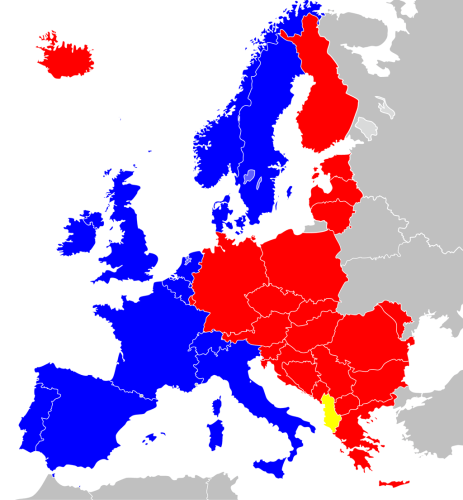While analyzing the slow agony of IE6 in this recent post, I noticed some curious trends that motivated me to investigate further. There have been many headlines earlier this month about Firefox taking over the lead from Internet Explorer in Pan-European browsing statistics (see the New York Times or the Guardian for instance).
Since Europe isn’t a totally unified block, culturally nor politically, I thought it would be interesting to increase the level of detail, and analyze those stats on the country level. The result is quite surprising:
Believe it or not, we are facing a true East/West divide! The colors in the above map indicate the dominating browser family, blue standing for Internet Explorer, red for Firefox. Without exception, in each of the former Eastern Bloc countries, as well as in whole South-Eastern Europe, the community-powered Mozilla browser has broken Microsoft’s market domination. That geographic bloc is joined by four countries from the “western block”: Germany, Austria, Finland, Iceland.
Now it’s up to us self-declared web analysts to come up with a smart explanation. First of all, what could be the deciding factors for browser adoption — are they economic, cultural, political? Let’s see what comes to our mind:
- Economic: are companies deeply rooted in the usage of one operating system/browser (Windows/IE)? Do they have huge IT departments that are slow to turn around? Do they have intranets and internal applications that are dependent on a particular OS configuration?
- Political: are schools, universities and public institutions provided with Microsoft-equipped hardware, or are governments and parliaments turning over to open-source? Does this impact the usage inside institutions and education? (I seem to remember that Bulgaria has taken steps in that regard).
- Economic/societal (1): what percent of the population has access to the Internet? If that % is smaller, we can assume that this segment of population has a higher “computer literacy”, and will be more selective of their software (and more able to download and install a program).
- Economic/societal (2): what percent accesses the Internet rather through public places (Internet cafes, schools, workplace) than from their home connection? If this % is higher, we can assume that the browser in those places is not the pre-installed one, but rather chosen by the IT staff — so it may be the browser that causes the lesser maintenance/security issues.
- Cultural stereotype (1): if you have grown up under communism, you may consider the choice of your communication tools as an expression of your personal freedom, and favor community-driven software products.
- Cultural stereotype (2): Germany, Finland, Iceland… : yes, we all know that those countries are densely populated by teutonic viking hackers, so that’s no surprise.
You’re welcome to share your thoughts on this matter, and stay tuned for the next episode in this series: Chrome – the South-Balkan Browser…

What about Albania ?
Albania is the first country (in europe, and maybe worldwide) where Google Chrome is the #1 browser.
More about that in an upcoming blog post …
The author is really cool. But some of the commentators are just posting stupid words.